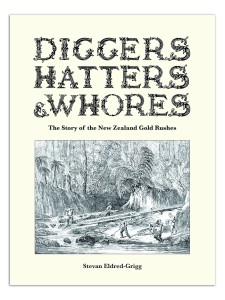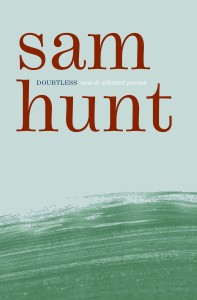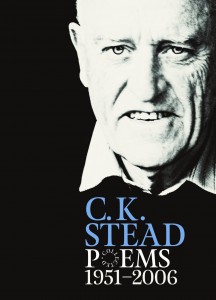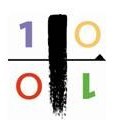Hachette New Zealand Award for
Best Non-Illustrated Book
Shortlist 2009
Designer Katy Yiakmis Designer Robbie Burton (interior), Sarah Maxey (cover) Designer Katrina Duncan (interior), Sarah Maxey (cover)

Title Diggers, Hatters and Whores: The Story of the New Zealand Gold Rushes by Stevan Eldred-Grigg
Publisher Random House New Zealand
Format 222mm x 163mm, 544pp, casebound with dustjacket
Judges’ comments Diggers, Hatters and Whores, the only non-poetry finalist, is an example of a book that, though partially illustrated, is strongly text-focused. Katy Yiakmis’s typography drives the book, with wonderful combinations of typefaces and beautiful placement of text on the page. The black and white cover on its textured paper is authentic to the period and, like the design itself, is orchestrated exquisitely. In the end, it was the liveliness and variety of the typographic treatment that made this work stand out amongst strong competition.

Title Doubtless: New and Selected Poems by Sam Hunt
Publisher Craig Potton Publishing
Format 215mm x 135mm, 264pp, hardback with dustjacket and ribbon marker
Judges’ comments Sarah Maxey also provided the cover design for Sam Hunt’s Doubtless, and plays hide-and-seek with the title. The combination of spontaneous brushwork and elegant typography deftly mirrors the interplay between the cultured and the informal in Hunt’s writing. Inside, Robbie Burton’s grid integrates poems of very different lengths, and his typography delivers an overall effect that is both serious and accessible.

Title Collected Poems: 1951–2006 by C.K. Stead
Publisher Auckland University Press
Format 240mm x 170mm, 568pp, casebound with dustjacket, printed endpapers, head and tail bands
Judges’ comments Sarah Maxey’s cover uses a gritty image and a hard, grainy paper to evoke the poems. The word ‘collected’ is semi-hidden – poetically compacted to form the O of ‘poem’. The reader is challenged even before opening the book. Once inside, however, Katrina Duncan’s elegant, well-placed type allows the poems to breathe and take their time.







